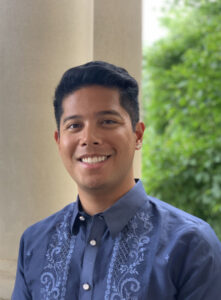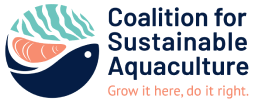The Coalition for Sustainable Aquaculture is proud to uplift the voices of our Future Leaders in this blog series: Meet a Future Leader. In this series we will interview the members of CSA that are Future Leaders set to make waves in aquaculture. We’ll learn what inspires them, what they hope to contribute to the world of aquaculture, and why they advocate for sustainable aquaculture.
First up is Angleo San Pablo, a master’s student at the University of California, Santa Cruz.

Tell us about yourself. What was your first introduction to aquaculture?
My name is Angelo Macapagal San Pablo, and I am a first generation Filipino American from Potomac, Maryland. I have many passions and interests, some of which include a love for the ocean and seafood.
One of my favorite memories is when I was little was when I visited the Philippines and walked with my Lolo (Tagalog word for grandpa) Demi to the palengke (Tagalog word for wet market) to see all the delicious seafood being sold. This lasting memory has driven me to pursue a life and career around the ocean and the food it provides us.
My aquaculture journey began in 2020, during the pandemic. I worked at a small startup aquaponics company that used fish waste as fertilizer for plants, and I was tasked to take care of the Nile tilapia that made the product. Several months later, I moved to Kailua-Kona, Hawai’i to become a hatchery technician for fellow CSA member Blue Ocean Mariculture—the first Aquaculture Stewardship Council-certified finfish production facility in the U.S. that raises Hawaiian kanpachi in open ocean waters.
What excites you about aquaculture?
There’s honestly so much to say! Looking back at my time as a hatchery technician, it was a humbling and rewarding experience to be a part of the process and witness firsthand how the fish we cared for grew from an egg. Being a farmer, technician, or deckhand can have its challenges, but it’s so much fun working with people who have the same passions and interests in raising aquatic organisms with care and sharing fresh seafood with family and friends.
Speaking of bonding over food, it’s also exciting to hear the stories of others and their journey with seafood—especially chefs. I attended one of CSA’s monthly Zoom meetings, and it was very inspiring to hear the chefs’ unique stories about how seafood (and food in general) has played such a significant role in their lives.
Why did you join the CSA? What are your goals as a Future Leader?
I joined the CSA because the values they stand for resonate with me: taking a responsible, science-based approach on raising aquatic organisms in U.S. waters; providing equitable access and opportunities for smaller aquaculture operations; and organizing the permitting process to reduce the complexities behind establishing aquaculture operations in federal waters.
As a Future Leader, I want to serve as a youth voice in aquaculture and support those who want to get involved. I would also like to use this as an opportunity to speak to other members, especially other future leaders and chefs, to identify ways in which we can effectively inform and educate others. Additionally, I want to tie in my shared knowledge and experiences with Filipino culture to highlight the importance seafood plays within the Filipino American community.
Why do you think aquaculture is important, particularly in the U.S.?
Aquaculture is vital because it supports the global seafood demand, and the trend is continuing to grow. According to the Food and Agricultural Organization (FAO), global aquaculture production has increased threefold in just the past 20 years! With the cultural and nutritional value seafood has, we need to think several steps ahead to properly meet the growing demand.
The U.S. has a lot of potential to responsibly produce its own seafood offshore. It is always surprising to hear that we import most of our seafood (about half of which is farmed). For the most part, we struggle to determine how our imported seafood is raised and what socio-ecological implications might have come into play to bring it on our plates. In the U.S., we have the research, the technological innovations, the regulations, and the right mindset to ensure that operations are sustainable and transparent.
What would you like decision-makers to know about seafood and aquaculture, particularly the SEAfood Act?
Aquaculture is an opportunity that will allow us to adapt to disruptions as a result of major global events like climate change, where we see impacts on seafood supply chains, peoples’ health and livelihoods, and the environment. We need to chart a path towards a more efficient process that addresses the many barriers that prevent us from expanding efforts (i.e. navigating the permitting process, social license, and financial support for small operations).
The SEAfood Act puts us on a trajectory towards increased resilience in sustainable seafood production. We need to take proactive steps on what we can do as a country to implement an efficient, equitable approach to achieve a reliable, sustainable food system that provides environmental, social, and economic benefits for the long run.
Is there anything else you would like to add?
I want to briefly mention that aquaculture is an innovative, diversified field with many practices that go beyond commercial seafood production. It is successfully supporting conservation efforts such as the restoration of native shellfish populations.
Educating and informing others is important to countering misinformation about aquaculture, and I strongly encourage people to visit U.S. aquaculture facilities (if you know of any in your area) to get the best learning experience.
Lastly, people always ask me what the best options are for purchasing fresh, sustainable seafood. My personal opinion is buying from local fishers and U.S. aquaculture farms will guarantee you the best quality seafood!
